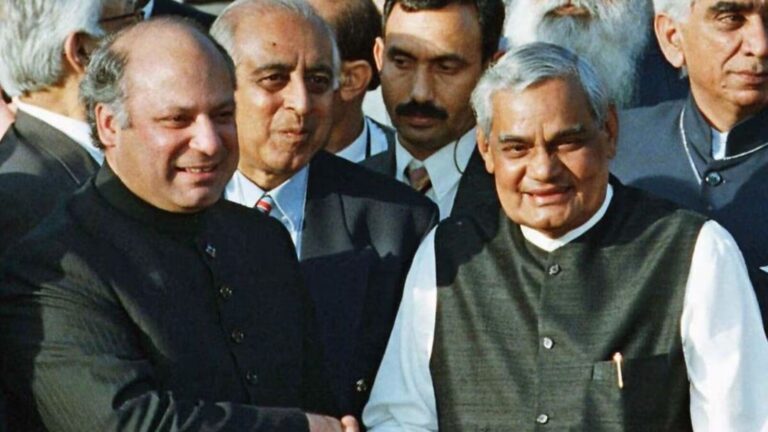In the 1999 Kargil War, 527 brave Indian soldiers were killed and over 1,300 injured defending their country against the invading Pakistani forces led by General Pervez Musharraf. The Indian government’s initial reaction to the war was one of “shock” as only a few months earlier, the prime ministers of both countries had signed the historic Lahore Declaration setting out a peace initiative between India and Pakistan.
In a rare admission, former Pakistani prime minister Nawaz Sharif admitted his country had violated the 1999 Lahore Declaration, which he signed with Indian Prime Minister Atal Bihari Vajpayee. “On May 28, 1998, Pakistan conducted five nuclear tests. After that, Prime Minister Vajpayee came here and made an agreement with us. But we violated that agreement… it is our fault,” Nawaz Sharif told a PML-N general meeting.
What was the Lahore Declaration of 1999?
India and Pakistan each conducted nuclear tests in 1998, raising global concerns about historical tensions between the neighboring countries. Following international pressure, Indian Prime Minister Atal Bihari Vajpayee decided to visit Pakistan and sign the historic 1999 Lahore Declaration with his Pakistani counterpart Nawaz Sharif.
The declaration outlined major steps that the two countries should take to improve bilateral relations and resolve outstanding issues, particularly the Kashmir dispute. Various objectives were set out in the 1999 Lahore Declaration, in which the two countries agreed to reaffirm their commitment to the principles and purposes of the UN Charter and their determination to implement the Simla Agreement in letter and spirit.
Key highlights of the 1999 Lahore Declaration
1. Nuclear and conventional weapons safety– Both countries stressed the need to take immediate steps to ensure the safe and authorized use of nuclear energy and to reduce the risks of accidental or unauthorized use of nuclear weapons.
2. Kashmir issue– India and Pakistan agreed to intensify efforts towards the resolution of all disputes relating to Kashmir through appropriate diplomatic channels.
3. Confidence-building measures– The two sides also agreed to keep channels of communication open and hold a systematic dialogue to address all concerns in order to build mutual trust.
Four. Commitment to multilateralism– Prime Minister Nawaz Sharif and Prime Minister Atal Bihar Vajpayee underlined their commitment to the South Asian Association for Regional Cooperation (SAARC), a multilateral organisation aimed at improving the welfare of the people of South Asia.
Five. terrorism– The Lahore Declaration also mentioned strict action against all actors involved in terrorism in all its forms and manifestations.
The Lahore Declaration was signed in February 1999, and just a few months later, in May 1999, Pakistani forces launched their military operations in Kargil. After more than two months of brutal warfare, Indian forces recaptured the key mountain peaks, and Pakistan suffered another humiliating defeat.
You are on Mint! India’s No.1 News Site (Source: Press Gazette). For more of our business coverage and market insights, click here!

